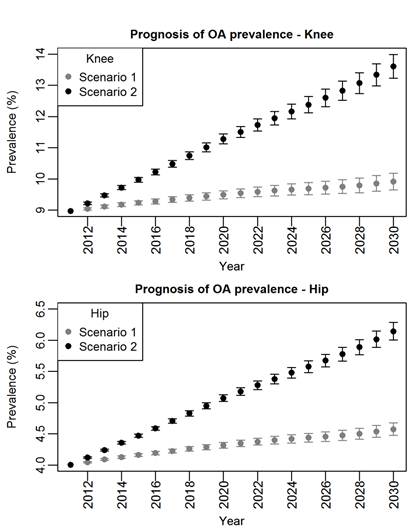Session Information
Session Type: Abstract Submissions (ACR)
Background/Purpose: To project the future prevalence of knee and hip osteoarthritis (OA) leading to doctor consultation.
Methods: The Skåne Health Care Register is a legislative, mandatory register in Skåne County, Sweden (total population 1.3 million), based on physicians’ International Classification of Diseases (ICD) 10 diagnostic codes. We used observational data on the consultation prevalence of the knee (M17) and hip OA (M16) by the 31st Dec 2011 based on the SHCR data from years 1999-2011. The age-specific (age 20-65 and >65 years) population structure prognosis and its confidence intervals for Skåne were provided by Statistics Sweden. We assumed two scenarios. In scenario 1 (conservative) we assumed that the age-specific prevalence would remain constant. In scenario 2 we assumed that the age-specific prevalence would increase relatively by 2.6% per year in the first 10 years and by 2% per year in the next 10 years for those aged ≤65 and by 1.6% per year in the first 10 years and by 1.2% per year in the next 10 years for the population >65. Initial values for that increase are based on the previously published changes in the prevalence of arthritis between 1994 and 2002 in Canada (Perrucio et al 2006). The reasons for this observed increase are not fully understood but the increase in obesity is the main plausible cause.
Results: In the conservative scenario which solely depends on changes in age distribution of the population, the consultation prevalence of knee OA in adults (aged 20+) will increase from 9.0% in 2011 to 9.9% in 2030. The hip OA consultation prevalence will increase from 4.0% in 2011 to 4.6% in 2030. Assuming the second scenario, i.e., an increase in age-specific prevalence, the consultation prevalence of knee and hip OA in adults will increase to 13.6% and 6.1% in 2030, respectively.
Conclusion: There is a risk for a 50% increase in OA prevalence in 20 years from now. Results suggest that fighting the negative impact of obesity will be of primary importance to reduce the occurrence of the OA in the future.
Figure. The prognosis of knee and hip OA consultation prevalence in Swedish adults (aged 20+). Vertical bars represent the confidence intervals of the prognosis due to uncertainty of the population prognosis.
Disclosure:
A. Turkiewicz,
None;
I. F. Petersson,
None;
J. Björk,
None;
L. E. Dahlberg,
None;
M. Englund,
None.
« Back to 2012 ACR/ARHP Annual Meeting
ACR Meeting Abstracts - https://acrabstracts.org/abstract/prognosis-for-the-year-2030-the-consultation-prevalence-of-osteoarthritis-in-sweden-may-increase-by-50/

